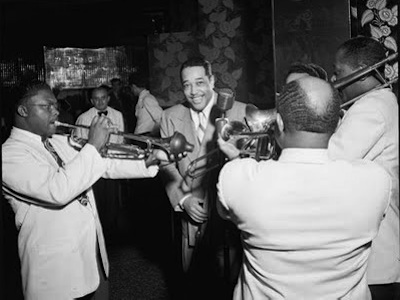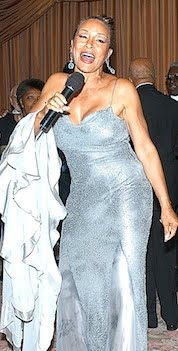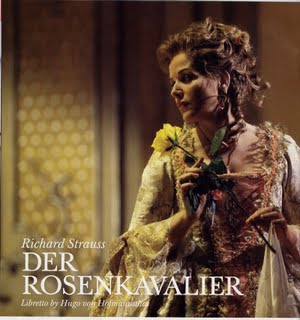"In jazz he was a giant among giants. And in twentieth-century music, he may yet one day be recognized as one of the half-dozen greatest masters of our time." – Gunther Schuller (1989)
Jazz legend Duke Ellington died in 1974, but his music lives on. The Duke Ellington Orchestra appeared with the Austin Symphony on New Year’s Eve at the Palmer Events Center in Austin, Texas and sent a large audience home with smiles on their faces.
I must confess that I went to this concert with one big question on my mind: "Is it possible to have a Duke Ellington Orchestra without the Duke himself at the piano, and without those legendary soloists who were the very heart and soul of the Ellington sound?"
Unlike most other bandleaders from the big band era (1935-1946), Ellington was a composer first and a performer second. And he didn’t compose in the abstract; he wrote for the men in his band and the way they played. Anyone familiar with the history of jazz knows all the great names in the Ellington orchestra: Johnny Hodges, Harry Carney, Jimmy Hamilton, Cootie Williams, Cat Anderson, Paul Gonsalves and so many more.
Some years ago the Lincoln Center Jazz Orchestra, led by Wynton Marsalis, no less, released an Ellington CD – Live in Swing City (Columbia CK 69898) – and it was a huge disappointment. The orchestra was terrific, but it didn’t put out anything resembling the Ellington sound.
So, did I get an answer to my question at the Austin New Year’s concert? Maybe. At least, I found myself reconsidering the question.
Ellington by the 'Book' Keeps Legacy Alive!
After Duke passed away, his orchestra was taken over by his son Mercer. When Mercer died in 1996, the leadership passed to Paul Ellington, Duke’s grandson. Over the years, the orchestra has kept the Duke’s legacy alive with tours here and abroad, but the personnel has been constantly changing.
If the truth be told, even when Duke was alive, his orchestra came together from a large pool of players who knew his ‘book’ and who could shift in and out without affecting the overall sound. At least that was the theory, and it had to be this way; even Ellington couldn’t guarantee full-time employment when the big band era came to an end after the war. Musicians went where the money was, and that meant that the best were sometimes unavailable when Duke called.
The situation today is much the same. The Duke Ellington Orchestra is not a full-time job. When it tours, it gets the best musicians it can, but they are not always the same personnel who went on the previous tour.
Trumpeter Barry Lee Hall Sets the Tone
The Duke Ellington Orchestra that appeared in Austin was led, not by Paul Ellington, but by Barry Lee Hall. A fine trumpet player, Hall goes back a long way with the Ellington orchestra and knows the ‘book’ like the back of his hand.
No list of personnel was made available at the concert, nor have I been able to get my hands on one; nevertheless, I would suspect that nearly all the musicians had many years of jazz experience. One of them I knew from previous encounters: the drummer Marty Morell. He played for years (1968-75) with the Bill Evans Trio and I knew him in Toronto for his work with Rob McConnell’s Boss Brass and other groups.
Soloist Freda Payne (photo: right) was featured with the orchestra in several songs. Miss Payne was born in Detroit and developed a major career as a jazz singer and actress in the 1970s. At an age when most singers of her generation have long since retired, she is still going strong. Although she had no particular association with Ellington, in the Austin concert she proved to be a fine exponent of the style.
The evening's entertainment began with Ellington’s ‘theme song’, Take the “A” Train – actually written by his close associate Billy Strayhorn - and continued with other Ellington classics such as In a Sentimental Mood, The Mooche featuring five clarinets in close harmony, Chelsea Bridge (also written by Strayhorn), It Don’t Mean a Thing If It Ain’t Got That Swing, Caravan, and Black and Tan Fantasy.
One of the highlights of the evening was undoubtedly the spectacular performance of Cottontail, in a version featuring two dueling tenor saxophones tossing virtuoso licks back and forth.
Austin Symphony More than Back-up in Three Black Kings
The Austin Symphony conducted by Peter Bay acted as a back-up band on several songs and sat out many of the others. The ASO had much more to do in the final selection, for which Barry Lee Hall chose music inspired by Ellington’s visit to a cathedral in Barcelona. Ellington was struck by a depiction of the three wise men on a stained glass window and wrote a suite in three movements titled The Three Black Kings, with the last movement named for Martin Luther King.
Ellington died before he was able to complete The Three Black Kings. After his death, the suite was completed by Mercer Ellington and Luther Henderson. Given the serious nature of the piece, it was indeed a strange choice for a Pops concert, especially as the final work on the program. But as part of a tribute to a great composer, it was an appropriate selection.
Concert Reveals a Spiritual Side of Ellington Rarely Considered
Ellington composed hundreds of pieces for jazz orchestra. As he grew older, he became more spiritual and began to spend more of his time writing music with religious content, culminating in the Concert of Sacred Music, which the Ellington orchestra performed in cities in the United States and in Europe.
Duke Ellington never stopped composing and never stopped searching for new ways to express himself through music. It was a long journey for a struggling bandleader-composer from the Cotton Club in Harlem in the 1930s, to the celebrity status he enjoyed in his later years. He never forgot who he was and where he had come from. He lived long enough to see the life and death of the great Martin Luther King - one of the three black kings indeed. His music had travelled far, but his soul had traveled even further, through the depths of the Depression and the hateful days of segregation, to emerge free at last and thankful to be alive.
With this new Year’s Eve concert, The Duke Ellington Orchestra gave a fully-rounded portrait of one of the most original figures in American music, and as 2009 drew to a close, gave a Texas audience plenty to think about.
Further listening and reading:
To hear Duke Ellington in his prime, with one of the greatest jazz orchestras ever assembled don’t miss Duke Ellington: the Blanton-Webster Band (RCA 5659-2-RB). There are no fewer than sixty-six songs in this boxed set including a legendary Cottontail featuring tenor saxophonist Ben Webster. If the music is not enough, check out a couple of books - Early Jazz and The Swing Era - in which Maestro Gunther Schuller tries to put the Duke's magic into words - and nearly pulls it off!
Labels: Austin Symphony Orchestra, Barry Lee Hall, Duke Ellington Orchestra, Freda Payne, Marty Morell






 Photo: Renee Fleming as the Marschallin in Richard Strauss' Der Rosenkavalier, on Saturday Jan. 9 in select theaters across Canada (photo courtesy of The Metropolitan Opera)
Photo: Renee Fleming as the Marschallin in Richard Strauss' Der Rosenkavalier, on Saturday Jan. 9 in select theaters across Canada (photo courtesy of The Metropolitan Opera)